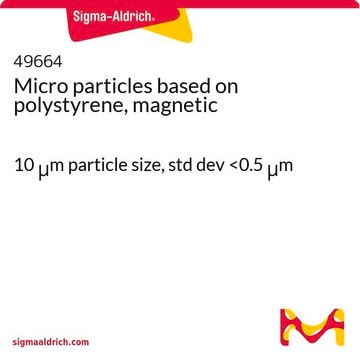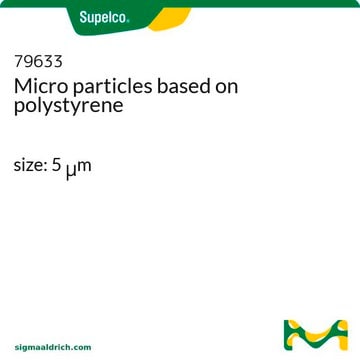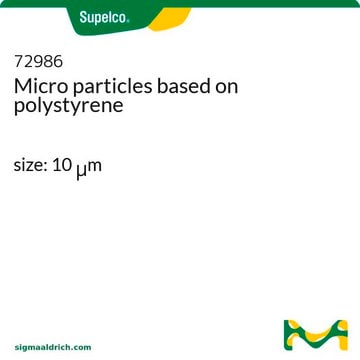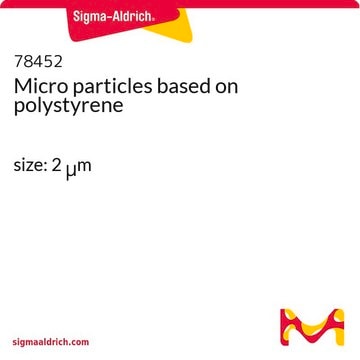39689
Micro particles based on polystyrene, magnetic
5 μm particle size, std dev <0.5 μm
Synonym(s):
Latex beads from PS, magnetic
Sign Into View Organizational & Contract Pricing
All Photos(1)
About This Item
UNSPSC Code:
12352207
NACRES:
NA.25
Recommended Products
form
aqueous solution
composition
iron oxide, ≥20%
concentration
5% solids
particle size
5 μm std dev <0.5 μm
storage temp.
2-8°C
Looking for similar products? Visit Product Comparison Guide
General description
Superparamagnetic iron oxide nanoparticles implanted in polymer microspheres are used in magnetic resonance imaging contrast enhancement, immunoassay, tissue repair, hyperthermia, detoxification of biological fluids, and drug delivery. Polystyrene microspheres (magnetic beads) are also widely used in cell separation and labeling.
Magnetic polystyrene particles
Application
Micro particles based on polystyrene, magnetic has been used in the preparation of poly(ethylene oxide) (PEO) solution and particles to study the viscoelastic focusing performance of the zigzag microchannel using both nonmagnetic particles and magnetic particles.
Storage Class Code
12 - Non Combustible Liquids
WGK
nwg
Flash Point(F)
Not applicable
Flash Point(C)
Not applicable
Personal Protective Equipment
dust mask type N95 (US), Eyeshields, Gloves
Certificates of Analysis (COA)
Search for Certificates of Analysis (COA) by entering the products Lot/Batch Number. Lot and Batch Numbers can be found on a product’s label following the words ‘Lot’ or ‘Batch’.
Already Own This Product?
Find documentation for the products that you have recently purchased in the Document Library.
Customers Also Viewed
Preparation of magnetic nanoparticles embedded in polystyrene microspheres
Hai NH, et al.
Journal of Physics. Conference Series, 187, 012009-012009 (2009)
Dan Yuan et al.
Electrophoresis, 42(21-22), 2230-2237 (2021-08-17)
Microfluidic particle focusing has been a vital prerequisite step in sample preparation for downstream particle separation, counting, detection, or analysis, and has attracted broad applications in biomedical and chemical areas. Besides all the active and passive focusing methods in Newtonian
Our team of scientists has experience in all areas of research including Life Science, Material Science, Chemical Synthesis, Chromatography, Analytical and many others.
Contact Technical Service






